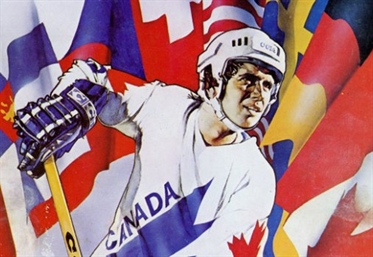Flashback 1978
Flashback 1978
Canada welcomes the world to Montreal

 Poster of the 1978 IIHF World Junior Championship in Montreal. Photo: Hockey Canada
Poster of the 1978 IIHF World Junior Championship in Montreal. Photo: Hockey Canada
It was one last reward for winning the top prize in Major Junior hockey the previous season.
That all changed in 1978 when the tournament came to Canadian ice for the first time, with Montreal playing host. Canada was represented by its very best players from across the country, a precursor to today’s National Junior Team.
Ryan Walter, who captained the 1978 team, says that the change could not have come at a better time.
“It allowed Canadians to witness what would be the next generation of professional hockey players,” Walter said, while also allowing a number of upcoming stars to make their debut on the international stage, including one who would become the greatest of all-time.
As a 16-year-old, Wayne Gretzky was the youngest player to participate in the 1978 tournament, his first of many international appearances. Gretzky’s age didn’t stop him from leading the tournament with 17 points (eight goals, nine assists) in just six games played.
In addition to taking home the tournament’s Top Forward honour, Gretzky earned a spot on the all-star team, alongside future NHL stars Vyacheslav Fetisov (Soviet Union), Mats Naslund (Sweden) and Anton Stastny (Czechslovakia), as well as Finland’s Risto Siltanen, a future Edmonton Oilers teammate of Gretzky’s.
As Walter recalls, kids like himself who grew up on the West Coast had all heard of Gretzky, but they had never seen him actually play.
“As a team, we were as amazed to see him play as the rest of the world. We were very proud to see the effort he put (in his game), and were also very proud to have him as a teammate.”
Continue readingIt was fitting Montreal played host to the first World Juniors on Canadian ice, as no city had more hockey history, and no building more revered in the game as the Montreal Forum.
“Playing in front of the Montreal crowd was an amazing experience,” Walter said. “It was like playing in the mecca of the hockey world, in front of fans that didn’t hold (their emotions) back.
“I remember the seats at the rink were always shiny. Lots of snow had fallen during the week prior to the tournament so heading to the arena had a magical feel to it. Players needed to enjoy the moment. They needed to know the outcome that they wanted, without necessarily focusing on it. In these types of championships, you can’t look too far ahead. If you do so, you tend to forget the process you need to go through in order to get to that specific outcome.”
The Canadians started the tournament with a 6-3 victory against the United States on Dec. 22, 1977. With the teams even 3-3 heading into the third period, Canada scored three times unanswered in the final 20 minutes, including Gretzky’s first international goal.
The tournament-opening win was followed up with a pair of one-sided victories, 8-0 over West Germany and 9-3 over Czechoslovakia on Christmas Day, with Gretzky racking up a hat trick and two assists against the Germans, and a hat trick and three helpers versus the Czechs.
Undefeated in the preliminary round, the Canadians were in tough in their medal round opener against the Soviet Union, which had dominated the early years of the tournament.
A goal midway through the third period was the difference and Gretzky was kept off the scoresheet for the only time in the tournament in a 3-2 Soviet win, all but ending Canada’s gold medal hopes.
Matching up once again with Czechoslovakia, the Canadians had a little more trouble the second time around, heading to the third period tied 2-2. But just as it did in its tournament opener, Canada pulled away in the third, scoring four times for a 6-2 win.
The 1-1 medal round record meant the tournament hosts would face Sweden on New Year’s Day 1978 with a silver medal on the line.
A fast-paced first period saw the teams head to the dressing room tied 2-2, and the Swedes took a 4-2 lead after two periods before Canada’s other Wayne, Wayne Babych, finished his hat trick with two goals early in the third period to bring the Canadians even again.
But Sweden again scored twice, and Walter’s late goal was only consolation in a 6-5 loss, relegating Canada to the bronze medal.
Gretzky’s 17 points remain the second-best by a Canadian at the IIHF World Junior Championship; Eric Lindros also had 17 in 1991, while Dale McCourt (1977) and Brayden Schenn (2011) share the record with 18.
Back to Overview


















































